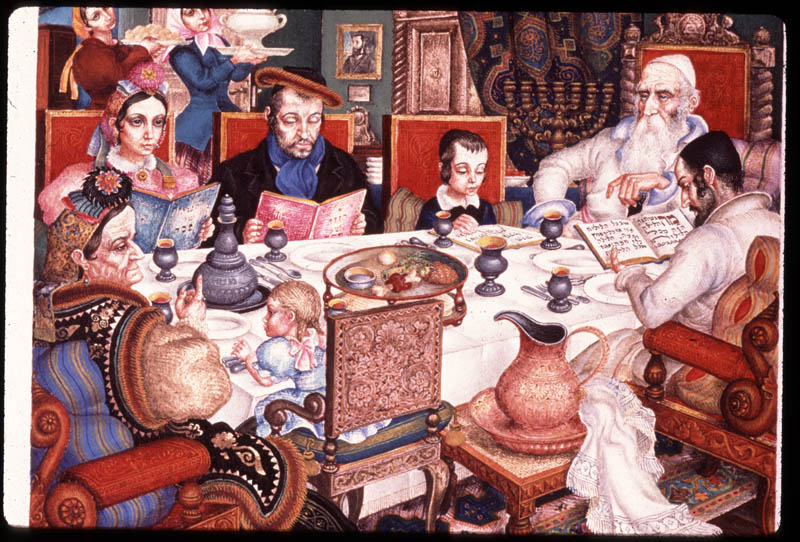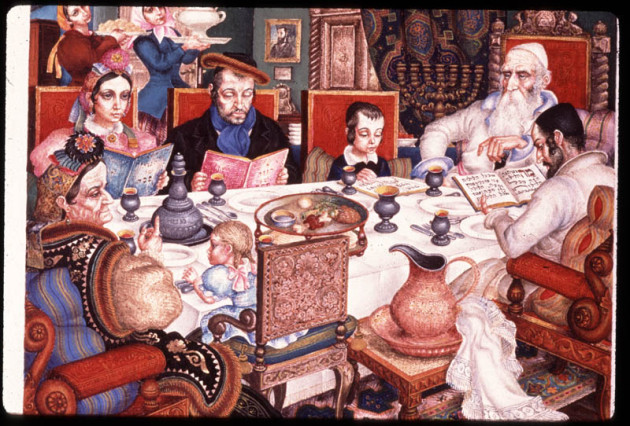
Passover: Freedom for Women NOW—Not 3000 Years Ago

“Passover,” Arthur Szyk, 1948. Yeshiva University Museum.
There is no holiday that brings out the screaming in my head as much as Passover.
There are two sets of noise that take hold of my brain at this time of year: the pre-Pesach (Passover) trauma and the Seder night trauma. Or as I have come to experience it, the trauma created by women’s stuff, and the trauma created by men’s stuff.
Growing up, the pre-Pesach anxiety began as soon as Purim was over. We were only allowed to eat from a pre-determined collection in the kitchen, we were on a schedule around what rooms were already sterilized, and my mother’s mood went from the usual cold and cranky to the downright hostile. Nothing was ever right, we walked on eggshells, and life was insane and frenetic. Although I often wonder how many of my traumas are from religion and how many are from my particular family, in this particular case I have come to learn that this kind of thing was going on not only my own house but also in many Jewish homes around the world. Even women of privilege engage in the panic. (I’ll never forget the time, years ago, when a mother frantically came to pick up her daughter from a play date around a week before Pesach, saying, “Hurry, I have to rush home and watch my cleaning lady do the kitchen.”) Pre-Pesach insanity, it seemed, was the Women’s Way, no matter how you celebrated the holiday.
I’ve been living in Israel for over 20 years, and it is still astounding for me to watch how this culture takes over Jewish women’s lives, no matter what kind of religious observance they adhere to during the year. Conversations in shops, on the street, and online, revolve around Jewish women of all backgrounds managing the minutia of obsessive cleaning, shopping, and cooking. There seems to be an uncontrolled lust for women comparing themselves to one another—who started cleaning and cooking earlier, who is having more guests, who is more efficient, who is more creative, and ironically also who has more time-saving hacks. Facebook doesn’t help, by the way.
Growing up in Orthodox Brooklyn, I found this pre-Pesach cleaning-cooking-hosting-mania was compounded by the other assault on women’s bodies: clothing shopping. Our job, as religious girls, was not only to manage the kitchen, but also to look gorgeous as we did it. We prepared our shul and Seder outfits meticulously and expensively, down to the last perfectly-matching accessory. But let me tell you something: there is nothing quite as dysfunctional within the female experience as surrounding yourself with copious amounts of food and then forbidding yourself from eating it. Women’s and girls’ table conversation, once we finished serving, invariably revolved around calories, points, fat content, carbs, gluten, GI, cellulite, whatever. (Each year, the measures for what we should or shouldn’t eat changed, led by trends announced by The New York Times. This added to women’s competition not only over who was thinnest, but also over who was the most in-the-know about how to effectively lose weight.)
2 comments on “Passover: Freedom for Women NOW—Not 3000 Years Ago”
Comments are closed.




Hi Elana
I already started giggling to myself when I read, “please be kind” I love reading your posts you are quite the writer, and though I can relate in some part to your memories, it strikes me that your childhood traumas were not so much to do with religion but more about your parents inadequacies, or issues.
Reading your article reminds me a lot of the kind of things written by women in non Jewish magazines about their own holidays, where the women seem chained to the sink and the men are lolling about.
Like you say its up to yourself to change things, but there is no need to do this at the expense of our traditions, my father used to tell me when he heard me yelling at my kids on erev Shabbos, “do you want your children to remember Shabbos as a day of stress? How much is the price of cleanliness ?
Like everything in our lives, we can choose to do it in a negative or positive manner, for example I try to feed everyone including myself just before Yom Tov, so we do not start the Seder in starving mode. [food is very important to me]
There are many simple ways we can ensure a happy, fun and stress free Yom Tov without compromising our religion.
I will leave you with something the Lubavitcher Rebbe said, when a woman complained that Pesach was too much work and her children refused to help, he replied, “dirt is not chometz, and your children are not karbonos”
Wishing you a terrific and fun Yom Tov
Love Yael
The knowledge you share really changes me in life, I sincerely thank you for the things you have done, sure your blog will help more people. Sincerely thanks
bloxorz